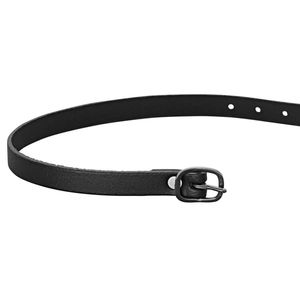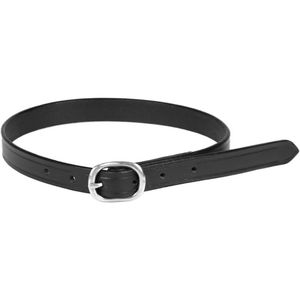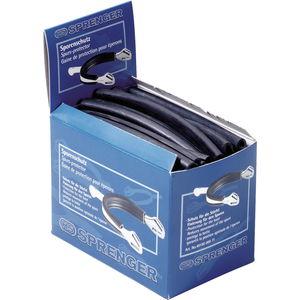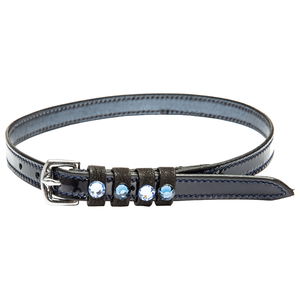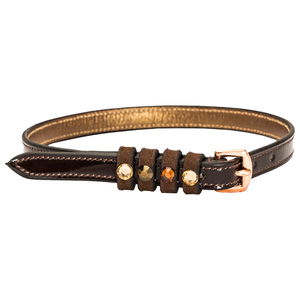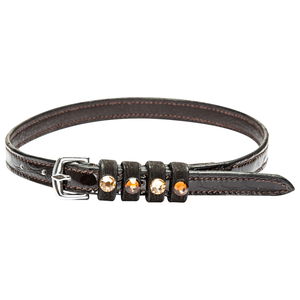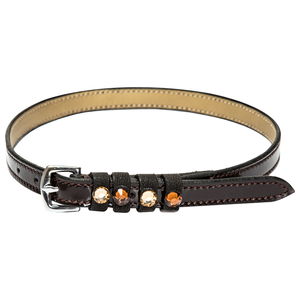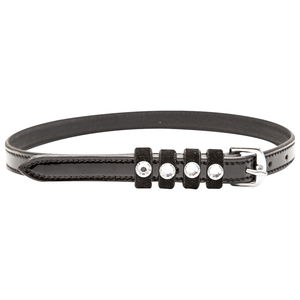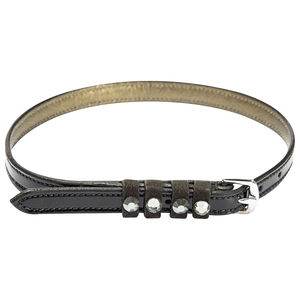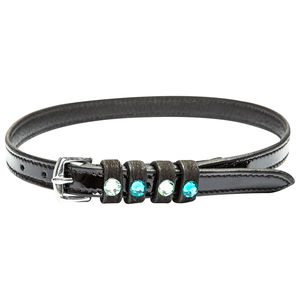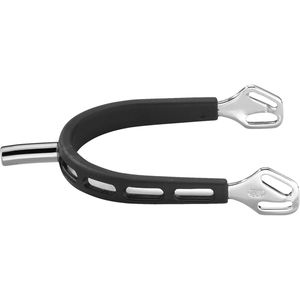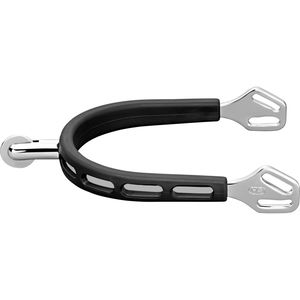Spurs for Horses
(113)As an enthusiastic rider, you will sooner or later come across the benefits of horse spurs: These practical tools are designed to support the rein aids... Learn more
Frequently asked questions about Spurs
Spurs are designed primarily to support the rider's leg aids. This reinforces the signal given to the horse and enables a fine and precise influence. When using the spurs on the horse's belly, the abdominal muscles of the horse tighten as a reflex, which causes the back to arch and leads to a better collection of the horse. Another effect is the increased stepping under of the hind legs, which leads to more impulsion. To ensure that spurs are used correctly, the rider should be experienced in the use of spurs, have a stable or well-balanced seat and be able to keep the leg steady against the horse. If used incorrectly, spurs can have negative consequences, in the worst case injure or deaden the horse. The motto is: "Spurs must be earned".
There is no general answer to the question of which spurs are the most suitable. First of all, a distinction can be made between spurs used in English riding and those used in Western riding. In English riding, the spurs are fastened with so-called spur straps, which are usually made of leather or nylon. Round end spurs, swan neck spurs, rowelled spurs or Prince of Wales spurs are often used. Western riders, on the other hand, often opt for rowelled spurs or swan neck spurs. However, it is important that the spurs match the body height of the rider. For example, if you have a long leg, it makes sense to use Prince of Wales spurs with a longer flat end or swan neck spurs. For riders who are somewhat shorter, it is advisable to wear short spurs, such as round end spurs. The character of the horse should not be forgotten, because not each of them shows the same reactions to spurs. For nervous and sensitive animals, it makes sense to use less sharp spurs such as round end spurs or Prince of Wales spurs. For more impulsive horses, rowelled spurs are suitable.
Before competing, it is advisable to have a look at the the Performance Test Regulations and the FEI guidelines. As a rule, spurs should be applied in such a way that the end is aligned horizontally or inclined downwards. The spurs must not cause any puncture or cut injuries to the horse and must not restrict the horse.
The most common way to use spurs is to place them in front of the heel using a spur strap and close it around the instep. This way the spur is at the back of the boot and can be used directly on the horse's belly. These spurs attached with a spur strap, however, should neither be too loose nor too tight and should not interfere with the rider's posture in the saddle. Alternatively, there are clip-on spurs, which, on the other hand, can only be used with a boot specially designed for this purpose. Another variant are the quick-on spurs, which are directly connected to the boot. In our online shop we offer a so-called spur protection belt especially designed for the use of spurs, which is attached to the saddle girth with a Velcro fastener and to the D-rings of the saddle with straps.
Horse spurs: great aids for experienced riders
Horse spurs can be an excellent support when riding. Because of the special ends, you can precisely pass on commands to your four-legged friend. Due to their shape, horse spurs act as a kind of intensifier of pressure commands: They stimulate the abdominal muscles and can therefore be better perceived and followed by the horse.
However, the use of these aids requires some experience and above all caution. If used incorrectly, you can overstimulate or even injure your horse. Therefore, it is important that only experienced riders with a calm temper and good intuition use horse spurs.
Riders using horse spurs for the first time should opt for short and strongly rounded spurs when riding. This way you can gradually get used to giving commands. Constant knocking, for example, leads to pain, which you can avoid if you use the horse spurs correctly. Round end spurs, for example, are suitable for beginners. They are particularly gentle and you can use them with or without a spur protector.
Different types of spurs for riding
In our online shop you will find spurs with various types of ends:
- Hammer spurs: the shape of the ends of these horse spurs resembles a hammer. This part can have slightly rounded or sharper edges.
- Flat end spurs: The thorn spurs have a prong at the rear end of the spur, which is positioned horizontally or straight. However, these are not pointed but rounded. Some of these flat end spurs are provided with a small ball and are therefore called ball spurs or roller spurs. Thanks to the rounded shape of the flat end spurs, the horse does not suffer any injury during use.
- Swan neck spurs: As the name suggests, swan neck spurs resemble the shape of a swan's neck - raised and slightly curved. The prong bends in an upward direction and is completely rounded.
- Spurs with rowels: Roller Spurs – are also available in a round shape as so-called sunwheel spurs. In this second variation of rowel spurs, the wheels are shaped like a small cogwheel with smooth or pointed teeth.
Riding spurs – fastening methods
Not only do the ends of the spurs differ, there are also several ways to attach them to the riding boot. For example, there are horse spurs that can be attached to the boot with the aid of a spur strap. For this purpose, the strap is passed around the instep and heel. It is important to check that it fits correctly. Spur straps should not be worn too loose or too tight. This is the only way to avoid unpleasant pressure points on the riding boot and it also makes sure that the commands to your horse's sensitive abdomen are precise.
A second version of this is the clip-on spur. These can be clipped into your riding boots by means of a specially designed hole in the heel. In the third version, the stop spur, you can opt for the riding spurs to be permanently attached to your riding boots. These spurs are fixed directly onto the riding boots.
Riding spurs in our product range
Two aspects should have the highest priority for every equestrian enthusiast: firstly, the well-being of the horse, and secondly, the issue of safety. When buying and using riding spurs, it is essential that these go hand in hand.
This is exactly the reason why we focus on a carefully selected product range that offers only the highest quality products. This way, you can use riding spurs without any worries.
In our online shop, we offer horse spurs and matching accessories of the following brands:
- Imperial Riding
- HS Sprenger
- Stübben Steeltec
- Dyon
- One Equestrian
- Freejump
- Tech Stirrups
It's all a question of type: finding the right spurs for your horse
It is not only your own experience as a rider that counts when choosing riding spurs. The horse itself also plays a decisive role. Depending on sensitivity, sensibility and physique, different models offer considerable advantages:
- Agile, impulsive horses: rowel spurs with rounded teeth are very suitable for this type of horse.
- Sensitive horses: ball spurs or short flat end spurs with a rounded end piece are an excellent choice here. These give gentle but clear impulses to the horse.
- Insensitive horses: plain rowel spurs have worked well for this character type.
- Small horses: Especially with a compact horse body, swan neck spurs are a good choice due to their shape. These horse spurs usually touch the appropriate spots on the horse's abdomen quite accurately, allowing a gentle but precise command to be given.
Spur straps, spur protectors and more: practical accessories for riding spurs
In addition to the horse spurs in our range, we also offer various high-quality accessories:
- Spur straps made of leather, nylon or perlon: The spur strap is used to attach the spurs to the boot when riding. You have a choice of different materials - some with decorative elements. With this accessory, you can add another detail to your riding outfit and round off your look.
- Spur protector in strap form: In our online shop you will find a reliable spur protector that carefully protects the sensitive body part of your four-legged friend. Thanks to the strap shape, you can give precise commands without risking injury through friction or too much pressure. Proper, professional use of the riding spurs is of course essential here. The key advantage of the spur protection strap lies in the fact that your horse can gradually become accustomed to the use of the command intensifier.





